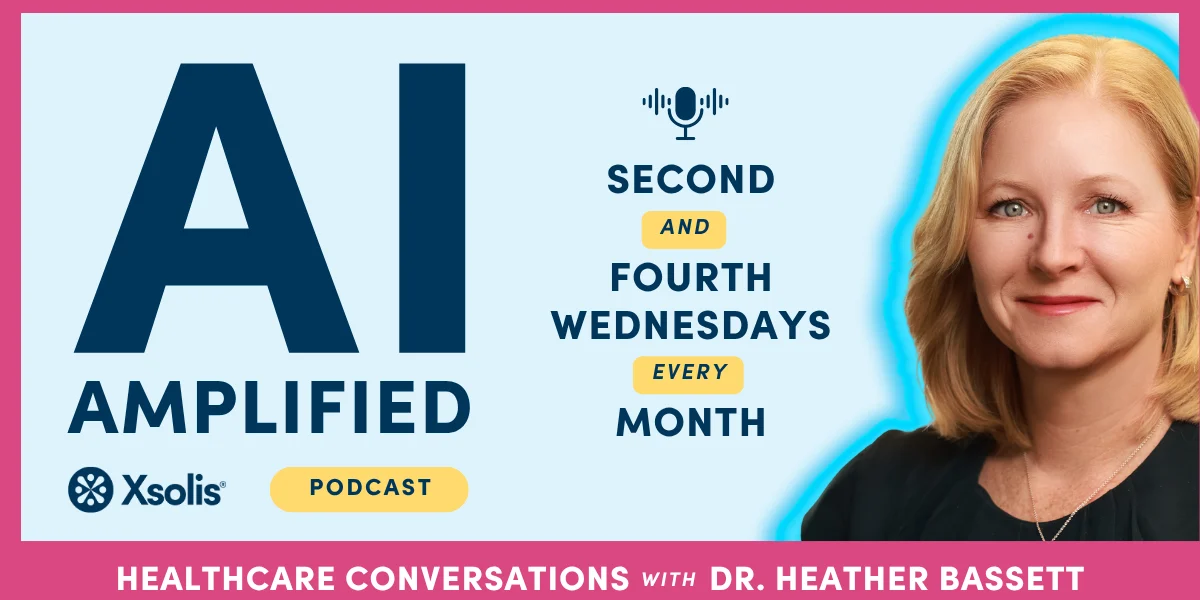Season 1: Episode 4
AI in Remote Patient Care
with guest Dr. Eve Cunningham, Chief Medical Officer, Cadence
Virtual Care Leadership Journey
Dr. Eve Cunningham, Chief Medical Officer at Cadence, shared her journey into virtual care and remote patient monitoring. Her career evolution from performing traditional obstetrics to leading virtual care initiatives was accelerated during the COVID-19 pandemic when she realized the potential of technology to improve physician workflows. She described how her background in clinical operations helped her successfully manage complex care coordination across multiple states and hospitals, eventually leading to her role at Cadence where she continues to focus on transforming healthcare delivery through AI and technology.
Remote Patient Monitoring Success Story
Host of AI Amplified, Dr. Heather Bassett, and Eve discussed the importance of considering physician workflows and patient perspectives when developing healthcare technology solutions. Eve explained Cadence’s unique approach to remote patient care, which includes a medical group to manage data and patient care, addressing the challenges of data overload and workforce limitations in healthcare systems. Cadence has successfully integrated with EMRs and clinical workflows across 18 health systems, serving over 57,000 patients with chronic conditions. Eve emphasized the need to transform patient management beyond traditional clinic visits, leveraging AI to improve care delivery and patient adherence through proactive monitoring and follow-up. Eve also noted their focus on tech equity, ensuring patients without smartphones or reliable internet access can still participate, with 75% of patients successfully self-activating their monitoring devices.
AI in Diverse Healthcare Settings
Eve and Heather discussed the challenges and opportunities in implementing AI and remote patient monitoring across diverse healthcare settings. Eve highlighted Cadence’s success in engaging patients from various socioeconomic and geographical backgrounds through partnerships with rural, urban, and academic health systems. Heather and Eve discussed the potential of AI to improve care delivery, particularly in areas like post-discharge monitoring for chronic conditions like congestive heart failure, and the possibility of expanding to other disease states such as COPD and prenatal hypertension. The duo reiterated the importance of ensuring equitable access to these technologies, addressing concerns about data availability and cost barriers. In fact, Cadence’s advanced primary care program focuses on such aspects to address gaps in patient care.
AI’s Role in Healthcare Decision-Making
Eve and Heather delved further into the role of AI in healthcare, emphasizing that while automation can be effective, clinical decision support requires human expertise for validation. They agreed that AI should be used to augment, not replace, clinicians, with applications in areas like patient outreach and workflow optimization, but not in autonomous clinical decision-making. They noted a generational divide in physician attitudes toward AI, with younger doctors being more tech-savvy but lacking years of clinical experience, while seasoned physicians may not be as familiar with AI tools. “The physician of the future is going to have to use AI,” Eve suggested, but noted there will continue to be vast opportunity for clinicians to help validate technologies as they emerge in the market.
Cadence’s Post-Discharge Program Launch
Eve discussed what’s coming next at Cadence, highlighting their post-discharge program in partnership with the American Heart Association, which aims to reduce hospital readmissions and improve patient outcomes. This program recently launched as Connected Care™️. Cadence’s growth has been largely driven by their cost savings and reduction in admissions for clients. Heather and Eve also discussed their respective career paths and the evolution of their roles in healthcare technology and operations.
Wrapping AI Around the Art of Medicine
Regardless of how healthcare technology continues to evolve, the duo agreed there is no amount of medical journals that can be “scraped” to approximate the clinical expertise that seasoned physicians bring to the healthcare experience – in essence, you can only learn the practice of medicine by doing it. Wrapping the AI around the art of medicine will be the key to future success, they agreed. Eve also offered, “As AI is becoming a democratized tool, the currency of the solutions is based around workflows, pathways, integration, and clinical validation. These four things require clinical and operational expertise to be able to do it at scale.”
Dr. Eve Cunningham on LinkedIn
Cadence
About the Host and Guest

Host
Heather Bassett, MD
Chief Medical Officer
Xsolis
Dr. Heather Bassett continues to drive AI innovation in healthcare to address operational challenges for health systems and plans, guiding them toward positive operational and patient outcomes. Rare among Chief Medical Officers at healthcare technology companies, she leads both the clinical services and data science teams. She architected Xsolis’ Care Level Score™, which integrates clinical expertise and data science to provide a numerical representation of the appropriate care status for each patient. This score and Xsolis’ AI-driven platform, Dragonfly, are uniting payers and providers during concurrent authorization processes to improve utilization management, patient outcomes, and reduce costs. Dragonfly is in use at hundreds of hospitals, health systems and health plans across America.
Dr. Bassett is passionate about advancing responsible AI in healthcare and is actively leading Xsolis’ involvement with the Coalition for Health AI (CHAI), an organization advancing the responsible development, deployment, and oversight of AI in healthcare, which Xsolis joined as an Early Member. Dr. Bassett was recognized by Nashville Business Journal’s Health Care Innovation Awards as Chief Medical Officer of the Year 2021 and by Becker’s Hospital Review’s Women in Health IT to Know 2023-2025. She has contributed articles or been featured in Newsweek, Forbes, AARP Magazine, InformationWeek, Becker’s, Fierce Healthcare, Medical Economics, MedCity News, Physicians Practice, and Patient Safety Quality Healthcare.
She earned a B.S. in biological sciences from Carnegie Mellon University and her Doctor of Medicine from the University of Texas Medical Branch, Galveston, Texas, where she worked as a research associate in the field of DNA repair. She undertook her residency in internal medicine at Vanderbilt University Medical Center and worked as a hospitalist at Centennial Medical Center in Nashville, Tenn., for eight years. She is board-certified in internal medicine.

Guest
Eve Cunningham, MD, MBA
Chief Medical Officer
Cadence
Dr. Eve Cunningham is the Chief Medical Officer at Cadence, a remote care delivery system supporting clinicians, patients, and health systems beyond the four walls of traditional care. A board-certified OB-GYN and nationally recognized leader in virtual care and clinical AI, Dr. Cunningham has spent the past two decades leading transformational programs at major nonprofit health systems.
Prior to Cadence, she served as Group Vice President and Chief of Virtual Care at Providence, where she launched enterprise initiatives including virtual nursing, remote patient monitoring, and hospital-at-home, and co-founded the AI-powered clinical decision support tool, MedPearl.
She holds an MD from Saint Louis University, completed her OB-GYN residency at Kaiser Los Angeles, and earned an MBA from the University of Massachusetts.
More on the Topic

5 Ways to Make Patient Care Management More Efficient in 2025
Summary: Efficient patient care management is critical in 2025. Healthcare systems can optimize outcomes and resources by adopting AI-driven tools and advanced care models. This blog explores five strategies to […]
The Ins and Outs of the Ethics of AI in Healthcare
Summary: AI is transforming healthcare, but ethical concerns continue to be top of mind. Addressing bias, transparency, patient privacy, and liability are crucial for responsible AI development. Organizations like Xsolis […]
7 Things Affecting the Average Hospital Length of Stay
Summary: Hospital length of stay (LOS) is a key metric tied to quality outcomes and operational efficiency. This blog explores seven factors impacting LOS and how AI solutions like Xsolis’ […]About AI Amplified with Heather Bassett
AI is here. It’s real. And it’s making major impact. If it seems like artificial intelligence is everywhere, you’re not wrong. Physician and data scientist Dr. Heather Bassett, Chief Medical Officer at Xsolis, is at the forefront of innovation and she cuts through the noise as she speaks with industry leaders who are making a real impact in the world of healthcare AI. AI Amplified focuses on the amazing innovations in AI, challenges the industry is facing, lessons learned, and how to ensure future success to bring back the joy in medicine.
Brought to you by:
AI Amplified is brought to you by Xsolis, an AI-driven healthcare technology company transforming the payer-provider dynamic and uniting these two crucial stakeholders like never before. Since 2013, Xsolis has been breaking down silos to eliminate friction, waste, and unnecessary manual work in healthcare.
Join us in solving some of the biggest challenges in healthcare. Request a consultation to learn more about Xsolis.
Let's Chat